Success of first Soil Association Scotland Organic Gathering
Around 150 people joined a sold-out Scottish Organic Gathering at the Bowhouse, Balcaskie Estate, on what was a sunny and crisp winter’s day in Fife.
There was real energy in the room with a wide-ranging audience of farmers and growers, food businesses, supply chain and public sector stakeholders, academics, government officials and representatives of non-government organisations.
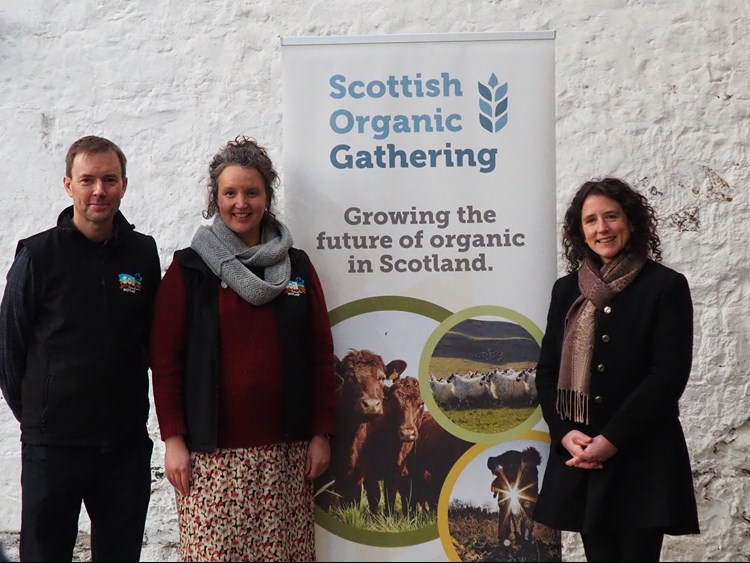
The joint Soil Association Certification and Soil Association Scotland event underlined the growing momentum around organic in Scotland, with six consecutive years of growth in the fully organic land area driven by consistent policy support from government and consumer demand for produce.
Organic Action Plan
Cabinet Secretary for Rural Affairs, Land Reform and Islands Mairi Gougeon gave the keynote address, setting out the Scottish Government’s commitment to the forthcoming Scottish Organic Action Plan.
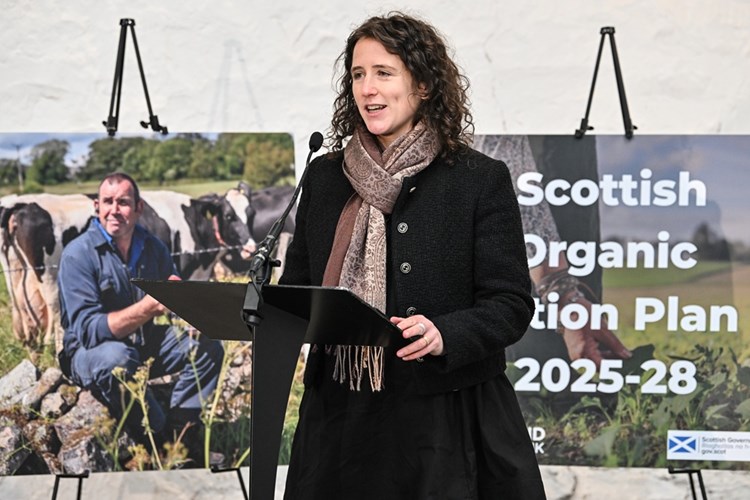
Ms Gougeon told the audience that £200,000 will be invested for the first year of a three-year strategy, with Scotland Food and Drink driving charge of delivery.
Her speech outlined the five main pillars of the plan:
- research/training and advice,
- raising awareness of organic,
- developing supply chains and markets,
- facilitating conversion and maintenance
- promoting public procurement of organic
In addition, the Cabinet Secretary re-affirmed the government’s commitment to supporting organic conversion and maintenance through the Agri Environment Climate Scheme (AECS) – which will run to at least 2030 with a new application window opening early in the New Year.
From farm to plate
The programme then moved on to a the first of three panel sessions, looking at scaling up organic farming, chaired by Soil Association organic sector development advisor Adrian Steele and featuring farmers Sarah Morbey (also the newly elected chair of the Soil Association Scottish Organic Producer Board), her partner Paul Coates at Coldwells Farm in Aberdeenshire, SAOS co-op development manager Adam Forrest, and David Erskine Livestock Procurement Manager at ABP Beef.
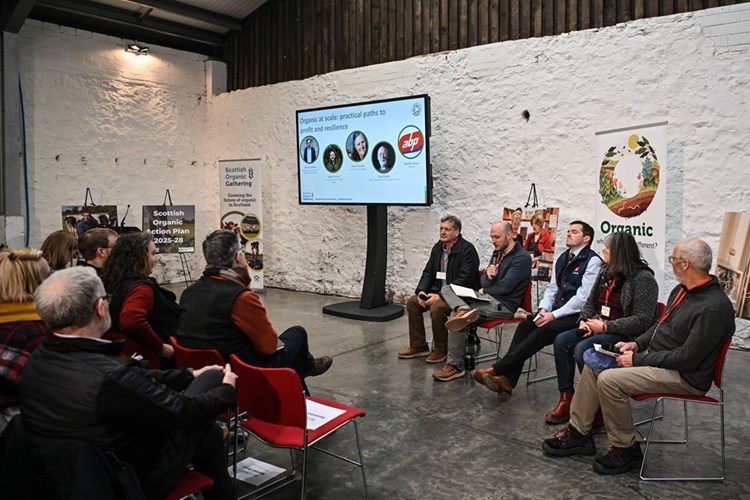
Mr Erskine revealed that one supermarket is looking to increase volume of organic red meat by 20–30% which presents both a challenge and an opportunity for future supply over the next 5–10 years.
With new data in Scotland showing an increase in organic beef cattle numbers, and more farmers converting, hopefully this supply can be co-ordinated with processing capacity to meet that opportunity.
The second session moved from farm to plate, with a focus on public sector procurement, wholesale and contract catering, chaired by Sarah Gowanlock, head of the Soil Association Scotland Food for Life programme.
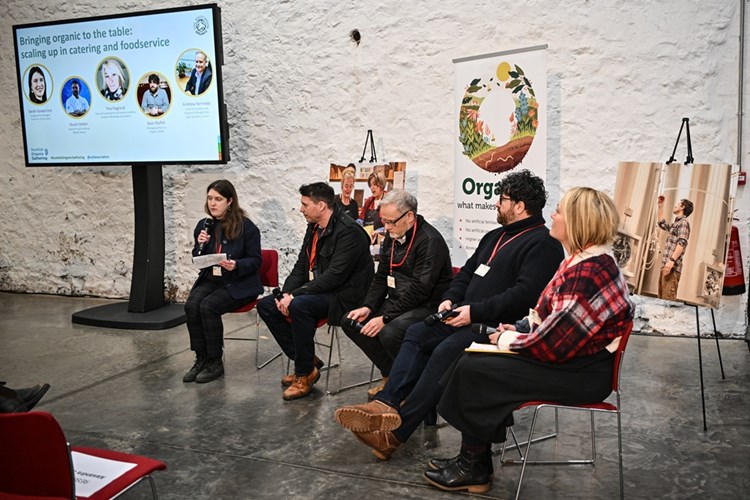
There was a wealth of experience on the panel, featuring Andrew Kennedy, Head of Facilities and Property Management at East Ayrshire Council, Stuart Aitken, Head of Food Scotland at Baxter Storey, Ylva Haglund, Head of Sustainability and Communications at the Scottish Wholesale Association and Sean Ruffell, Managing Director at Organic North.
Among many stand-out lines from the discussion was a point that Stuart Aitken made about ‘education’ and conversations with customers about “better tasting products”. The example of Mossgiel Organic Milk was used, with “a couple of percent increase” in costs of coffee/milk to private clients being worth it due to the quality of the product as well as the environmental impact.
Policy and consumer trends driving growth
After the (organic) lunch, it was onto ‘drivers for organic success in Scotland’ focusing on policy, marketing interventions and consumer trends with Alison Muirhead, Senior Commercial Manager at Soil Association Certification, Michael Bond, Sales Manager at Soil Association Exchange and Alexandra Sadler from Edinburgh University. One of the most interesting elements of those presentations were the insights on the organic consumer, busting myths that it remains the preserve of those on higher incomes.
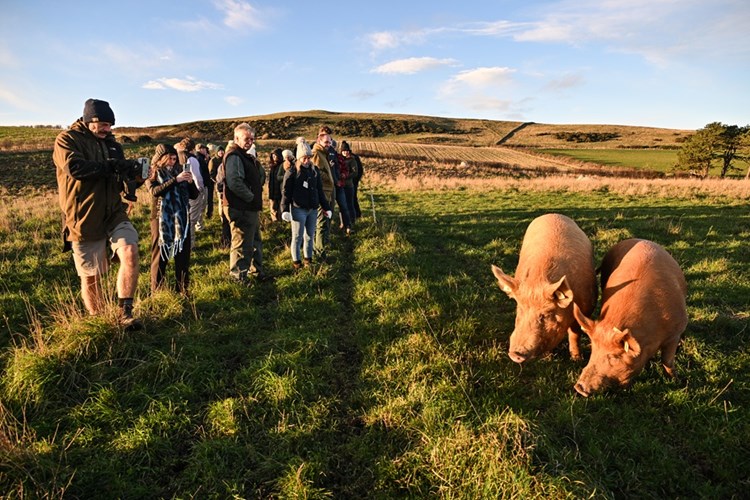
And, building on the Cabinet Secretary’s speech in the morning, there was some more data demonstrating that the consistent policy support through the Agri-Environment Climate Scheme (AECS) since 2015 and a suspension of the area cap for land in conversion since 2023 has helped to drive the six consecutive years of land area growth.
Then in the afternoon, delegates were provided with a choice of activities including a tour of the farm operation at Balcaskie, butchery and breadmaking demonstrations, and a walk around the market garden.
Take aways/next steps
The main takeaway from the day is that there is a huge amount of energy and enthusiasm about organic across all the organisations and producers present.
One of the most gratifying elements was watching all the conversations happening between the panel sessions and over lunch. It felt really productive with lots of connections made. Hopefully those links will bear fruit in the months ahead.
The government investment in the Organic Action Plan will trigger a lot of activity to develop and grow markets for organic produce – and keep that momentum going.


